- Home
- Kay Hooper
The Lady and the Lion Page 2
The Lady and the Lion Read online
Page 2
The thought had barely registered when he heard the soft click of her balcony doors, the whisper of silk as she moved. He felt her presence on the other side of the screen with an intensity that took him by surprise, and he couldn’t stop himself from greeting her.
“Good morning.”
“Good morning.”
She was disturbed, he realized instantly; it was in her voice, a tremor that could have been pain or anger—or both. He found himself turning slightly toward the screen, staring at it as if he could penetrate it and the darkness. But he couldn’t, of course, not with his eyes.
“Bad night?” he asked quietly.
A kind of laugh reached his ears, a sound that held very little humor. “No, the night was all right.”
He was silent for a moment, then spoke in the same quiet, undemanding tone. “Sometimes, it’s easier to talk to a stranger when we’re upset. And easier to be honest in the darkness.”
“Dawn questions?”
“Only if you want me to ask them,” he told her. “I’ll listen, if you do. Maybe the answers will come.”
If she hesitated, it was momentary, and when she spoke again her voice was taut. “How do you tell someone you love that you can’t be what he wants you to be?”
Keith felt a strange pang that he refused to acknowledge. “What does he want you to be?”
“There.” She laughed, again with no humor. “Just there, on the edge of his life. Playing the role he wants me to play. Shaping my life to fit his.”
“And you can’t do that?”
“I have. For a long time. And it’s…smothering me. The demands and expectations. It wouldn’t be so bad if I felt useful, that I mattered. But all his attention is devoted to his work, and sometimes I think I’m invisible to him. I have to break away. At least, I think I do. But I don’t know how to tell him without hurting him. And I don’t know what I’ll do after.”
“What do you want to do?” Keith asked.
She sighed. “I don’t know. That’s one reason I’m here, to try and figure it out. And now…This morning, when I called, he told me to come home. Back to London. He can’t find anything, he said, and his secretary is hopeless. He needs me to keep his life running smoothly.”
“That doesn’t make you feel that you matter to him?”
“No. Someone else could do what I do. It isn’t me he values, it’s what I do for him.”
Keith hesitated, then repeated, “What do you want to do?”
“I don’t want to go back. Not yet. It’s such a strong habit, to be what he expects, that I’m afraid I’ll just take the path of least resistance if I go back now.”
He couldn’t help but wonder, with another strange and unacknowledged pang, if they were discussing her husband or lover. It sounded that way, he thought. He didn’t want to ask outright, wary of being something other than the disinterested and impersonal voice he had promised to be. So he kept his voice soft, his questions dispassionate.
“Did you tell him?”
“No. I told him I was enjoying my vacation, told him I need the break.”
“Why can’t you tell him the truth?”
“I don’t want to hurt him.”
“You’re hurting yourself by remaining silent. Wouldn’t that hurt him if he knew?”
“I don’t know.”
She sounded a little lost now, and he responded instinctively to that pain. “You aren’t sure he loves you?”
“No, I’m sure he does. It’s just…well, his career is the most important thing in his life. I think he expects it to be the most important thing in my life too. You see, I’m something of an asset to his career. He’s told me that more than once. Others have told me as well.”
Keith was too curious to let that pass. “How are you an asset?” he asked. For a long moment, it seemed as though she wouldn’t answer, but then she did, her voice holding a hint of constraint.
“It’s difficult to explain. There were people he was having trouble making connections with until I began to act as his hostess at dinners and parties. People would tell me things they wouldn’t tell him, things he needed to know. He says I have the knack of listening.”
Frowning in the darkness, Keith said, “He’s using you.” There was a slight sound on the other side of the screen, as if she moved almost instinctively in protest.
“It didn’t seem so at first. Meeting people, talking to them. I never got information damaging to anyone, just little things, bits and pieces that might have given him an edge. I was willing to do it. It’s important, what he does, and I agree with his goals. Usually.”
“But not always.” It wasn’t a question.
“No. No, not always.” Her voice turned rueful. “But he says that I don’t understand the large picture, the long-term view of things. That my duty is to tell him whatever I learn and let him decide what’s to be done with the knowledge.”
“How do you feel about that?” Keith asked.
“Patronized.” The response was instant and sharp. After a moment, she laughed a bit shakily. “It all began to build up inside me, that’s why I left.” She hesitated again, then said, “I’m sorry. I have no right to dump all this in your lap.”
Keith, who had been thinking even as he listened, ignored her words. Slowly, he said, “Someone you love expects you to play a part that makes you uncomfortable, to be a pipeline for information that helps him in his career. He expects you to fit yourself into his life in a way that satisfies his needs rather than yours. You feel you don’t matter to him except in that role. Even more, his demands are smothering you. Your own thoughts and opinions aren’t valued, your life isn’t yours to live.”
“Did I say all that?” Her voice was small.
“I think you did.”
“I’m sorry.”
Turning his gaze out toward the ocean and the graying darkness that heralded daybreak, Keith said, “Don’t be. I’m just here to listen to the tough dawn questions, remember? And the most important question, I think, is—what are you going to do about your problem? Running away hasn’t solved anything.”
“Running?”
“It’s what you did. You couldn’t tell him how you felt, so you just left. But now he wants you to come home. So what are you going to do?”
“I’m not going home. Not yet. Maybe if I stay away long enough…”
“He’ll change? Do you really believe what you’re saying?”
“No.” She sighed almost inaudibly. “I don’t. He doesn’t even recognize a problem. And he won’t until I confront him. That’s what you’re saying, isn’t it?”
“You said it.”
“I’ll hurt him. I don’t want to hurt him.”
Keith hesitated, then said, “Do you really believe it’s better to go on hurting yourself? To go on living a life you don’t want, being a person you’re not? If he knew what this was doing to you, do you believe he’d choose to enrich his life at the expense of yours?”
Answering the last question, she said very quietly, “I hope not.”
They were both silent for several minutes while the sky lightened in the east, and then she stirred slightly. “Tough questions. It doesn’t help much that I know the answers.”
“Sometimes,” he said, “knowing the answers gives you nothing except more questions.”
“Until another dawn?” Her voice was wistful.
He hesitated, then said, “Don’t force it. Take the time you need and let the answers sort themselves out. We always know what’s best for us, if we’ll just be patient and allow our instincts to tell us.”
“Then I’ll try. Thanks. I had no right to impose, but you’ve been a lot of help.”
“No problem.” He resisted the urge to keep the conversation going, telling himself firmly there wouldn’t be any more morning interludes like this one. Already, he’d gotten involved despite himself, her problems worrying him, and he just didn’t have the energy to spare. It had to stop.
“Well…thanks ag
ain,” she murmured, and he listened in silence to the soft sounds of her leaving the balcony.
He sat gazing out at the dawn, watching the first reddening of the horizon become a blazing sunrise. He did get up and look down on the beach where she was beginning her morning run. Red hair. Beyond that, he didn’t think very much. After a while, he went into his suite and to bed.
He didn’t go out onto his balcony the next morning.
—
Erin spent most of the day just thinking. She walked on the beach, swam in the hotel’s pool, treated herself to a sauna and massage. It was rare for her, this luxury of time to herself, and she enjoyed it. The sense of guilt she felt at so abruptly having deserted her father was still with her, but fainter now and much less painful than it had been.
Other problems didn’t seem so overwhelming now, and she was even able to feel a kind of wry amusement at the number of male hotel guests who apparently felt she shouldn’t be alone. It was something Erin had coped with since her teens, and the stage of being flattered by the attention was long past. She had learned, often painfully, that her looks drew men who were never interested in seeing beneath the centerfold proportions and striking features…men who never cared about her ideas or her feelings.
But they did want to talk to her. Oh, yes. They talked as if a dam had burst. They spilled out words in a torrent, tending to stare at her while doing so, telling her things she had no right to know. That was the “asset” her father appreciated so much. Even men with high security clearances who certainly should have known better told her things they shouldn’t.
To impress her, according to her father.
Her quiet balcony-neighbor had been right; her father was using her to further his own ambitions. Perhaps she’d feel differently about her talent if it were important in her own career or project to be able to glean information—but she doubted it. Seldom willing to hide her own motives or intelligence for any reason, she was unlikely to choose a career that demanded an ability to interrogate or dissemble.
So what did she want to do with her life? A tricky question—especially for a woman of twenty-eight who should have made her choice long ago.
The answer came to her that night as she lay awake in bed, drifted into her mind and settled firmly. She wanted a simple life. Love, a home, children.
She had grown up in a lifestyle so many people seemed to think was glamorous. The expensive schools, living and vacationing in exotic places, wealth. She had worn jewels and designer gowns, sailed on yachts, flown in private jets. She had, quite literally, danced with princes.
But she had never felt she quite belonged in that life. More comfortable with her hair loose and her face free of makeup, wearing jeans or sweatpants, she had turned herself into a part-time lady to please her father. Now, lying awake in her quiet bedroom, she knew it had been a loving gesture that had backfired. She could be a part-time lady, but she could never replace her mother and she couldn’t go on submerging so much of herself out of guilt.
She wanted a home and family. She wanted a simple life. She wanted to paint.
That last was so surprising a thought that she actually caught her breath. Paint? Well, sure, she’d painted in school; in fact, her art teacher had said she was quite good. But she’d never been conscious of the desire to go on with it. Had she?
Erin let the tantalizing thought follow her into sleep, quite wary of making a quick—and possibly wrong—choice.
She woke up around four and ordered coffee and juice sent up, grateful for twenty-four-hour room service that delivered her order promptly. It helped her to be awake and clear-minded when she called London a few minutes later. The call went through quickly, and she kept her voice calm and casual when she greeted her father.
“Hi, Dad.” Characteristically, her father had more important things on his mind than a polite greeting.
“Erin, I can’t find next month’s schedule. Where on earth did you put it?”
“It’s in the center drawer of your desk,” she answered automatically. “Dad—”
“They want me in Turkey in six weeks. Burleigh’s retiring, and I’m to fill the post for at least a year. It means packing up and moving again but there shouldn’t be a problem, you’ve gotten quite good at it. The residence is furnished, of course—”
“Dad.” Erin drew a deep breath. “I won’t be going with you, to Turkey or anywhere else.”
“Nonsense, of course you will.” Richard Fane Prentice, Earl of Westford and the ambassador Britain chose to utilize for temporary duty in sensitive areas of the globe, sounded merely impatient. “There’s a great deal to do, Erin, so you’d better come home right away.”
“No,” she said softly.
Silence, utter and astounded, greeted that simple word.
Erin took another breath. “Dad, I didn’t choose a diplomatic career. You did. It’s your life we’re talking about, not mine. I have to live my life. I’m not even sure I want to stay in England. I’ve always felt more at home in the States.” She hesitated. “I’m a coward to tell you like this, I know, but I just didn’t know how to say it. I don’t want to hurt you, or disappoint you, and I don’t want us to fight—”
“Erin, what are you talking about?”
She winced at the grimness she heard in his voice, and forced herself not to weaken. “I’m talking about choices. I have to make my own, Dad. I have a lot of thinking to do, but I know that the one choice I won’t make is to fit myself into your life because that’s where you want me to be. I’m sorry.”
“Come home,” he said quietly. “We obviously need to talk, and not like this.”
She managed a faint laugh. “No, I’m not brave enough to come home just yet. The habit of doing what you want is too strong. Besides, I know you’ll ask questions—and I don’t have all the answers. I will, but I need time to myself to find them.”
“Erin, we have to talk about this.”
“Yes. But not just now. I only wanted to tell you that I won’t be coming home today—or in two weeks. I’m going to stay here for a while. Maybe go up to New England and visit Mother’s family. And I won’t be calling every morning. Your secretary isn’t hopeless, Dad, and you aren’t nearly as absent-minded as you think; you don’t need me to keep your life in order.”
He was silent.
There was a great deal Erin would have to tell him eventually. As he’d said, they needed to talk face to face. But even though she’d managed to say more than she had expected to be able to, she wasn’t yet ready to confront the problems head-on. She’d given him something to think about, and that was enough for now.
“I’ll call you in a few days.”
“Erin—”
“In a few days, Dad. I love you. Bye.” She cradled the receiver and stared at the phone for a few moments, feeling that a weight had eased even if it hadn’t completely disappeared. She wasn’t sure her father would patiently wait until she decided to call him again, but she hoped he would. And she brushed aside the faint pang of guilt she felt at having hit him with this just when he was preparing to take on a new assignment. Where her father was concerned, there would never be a “right” time, she knew.
She rose from the edge of the bed before she realized where she was going, but wasn’t very surprised that her steps led her directly to the balcony doors. He had given her the courage to begin confronting her problems, and she wanted to tell him that. She opened the French doors and went out into the cool darkness.
He wasn’t there. She knew. She felt it. There was an absence, an emptiness on the other side of the security screen. Still, distrusting her own senses, she couldn’t help but ask softly, “Are you there?”
Silence, except for the muted sound of the waves below.
Disappointment and an odd sense of hurt swept over her, and Erin chided herself for the feelings. What was wrong with her? It wasn’t as if they had an appointment out here, or that she could expect anything at all from him.
“Idiot,” s
he muttered to herself. Maybe he’d gone straight to bed, tired after work. Or maybe his job had ended and he’d checked out of the hotel.
He was a stranger, after all. Just a quiet voice in the darkness that had eased her anxiety and shown her the right path to take. She didn’t know him. Not his name. Not even what he looked like. And why did he matter to her? It was ridiculous. She’d wanted no demands, no obligations or expectations, and here she was upset because he wasn’t where she’d expected him to be, where she wanted him to be.
She reminded herself of all that. But she waited. The eastern horizon lightened, graying toward dawn. The first purple and pink tendrils of light turned red and then gold. The sun peeked over the rim of the ocean cautiously, then lifted, finally, to announce a new day.
He didn’t come.
Chapter 2
Keith hadn’t expected it to be so difficult. He’d told himself firmly he wouldn’t go out onto the balcony the third morning, and he managed not to. Instead, he had remained in his sitting room, gazing at the balcony doors, watching the dawn from that silent, lonely vantage point. When he finally went to bed, he didn’t sleep well.
His first clear thought on waking in the afternoon was of her. He wondered if she’d called the man in her life, if she was still worried. He wanted to know those answers with an anxiety that unnerved him—and made him angry. What on earth was wrong with him? For months, he’d been single-minded to the point of obsession, all his thoughts and determination, all his emotions, fixed immovably on the plans he had so cautiously put into motion.
And now…He was so close he could almost feel hot breath on the back of his neck, the end of it all finally in sight, and at the very point when he most needed every thread of his concentration he couldn’t get this woman out of his mind.
Dangerous wasn’t the word for it.
He didn’t know what it meant, this fixation on a woman whose name he didn’t know, whose face he’d never seen. The timing couldn’t have been worse; he didn’t like what was happening to him. He didn’t like it because he couldn’t seem to control it.

 A Deadly Web
A Deadly Web Raven on the Wing
Raven on the Wing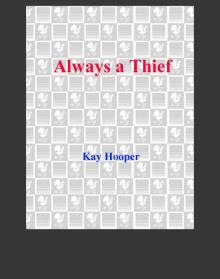 Always a Thief
Always a Thief Star-Crossed Lovers
Star-Crossed Lovers Blood Dreams
Blood Dreams Shades of Gray
Shades of Gray Rebel Waltz
Rebel Waltz Chill of Fear
Chill of Fear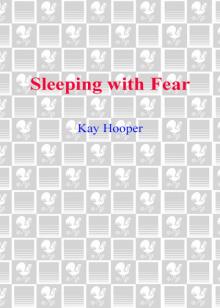 Sleeping With Fear
Sleeping With Fear After Caroline
After Caroline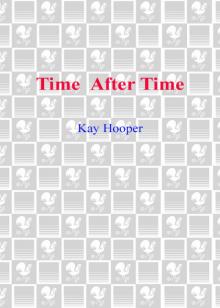 Time After Time
Time After Time Haunting Rachel
Haunting Rachel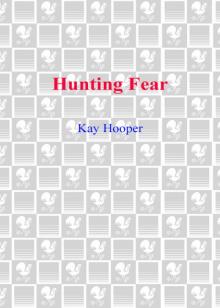 Hunting Fear
Hunting Fear Out of the Shadows
Out of the Shadows Whisper of Evil
Whisper of Evil Blood Sins
Blood Sins Hiding in the Shadows
Hiding in the Shadows C.J.'s Fate C.J.'s Fate C.J.'s Fate
C.J.'s Fate C.J.'s Fate C.J.'s Fate Fear the Dark
Fear the Dark Illegal Possession
Illegal Possession Stealing Shadows
Stealing Shadows If There Be Dragons
If There Be Dragons Once a Thief
Once a Thief In Serena's Web
In Serena's Web On Wings of Magic on Wings of Magic
On Wings of Magic on Wings of Magic Hostage
Hostage The First Prophet
The First Prophet Through the Looking Glass
Through the Looking Glass Golden Flames
Golden Flames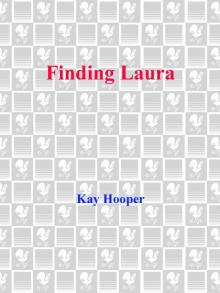 Finding Laura
Finding Laura Haven
Haven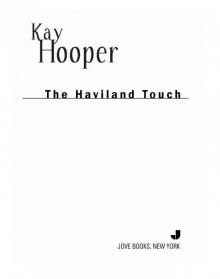 The Haviland Touch
The Haviland Touch The Lady and the Lion
The Lady and the Lion Haunted
Haunted Velvet Ligntning
Velvet Ligntning Blood Ties
Blood Ties Adelaide, the Enchantress
Adelaide, the Enchantress The Matchmaker
The Matchmaker Golden Threads
Golden Threads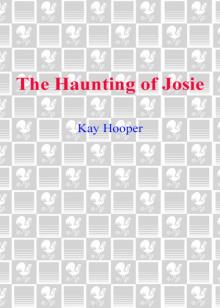 The Haunting of Josie
The Haunting of Josie Rafferty's Wife
Rafferty's Wife Amanda
Amanda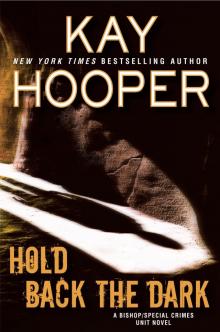 Hold Back the Dark
Hold Back the Dark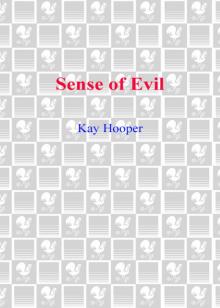 Sense of Evil
Sense of Evil What Dreams May Come
What Dreams May Come Larger Than Life
Larger Than Life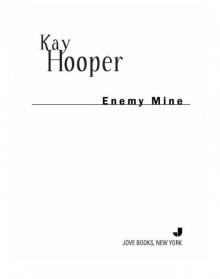 Enemy Mine
Enemy Mine Velvet Lightning
Velvet Lightning The Fall of Lucas Kendrick
The Fall of Lucas Kendrick Aces High
Aces High Captain's Paradise: A Novel
Captain's Paradise: A Novel The Wizard of Seattle
The Wizard of Seattle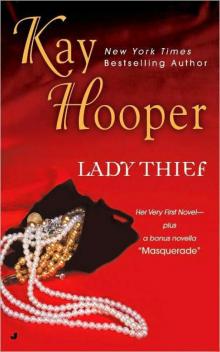 Lady Thief
Lady Thief Summer of the Unicorn
Summer of the Unicorn Outlaw Derek
Outlaw Derek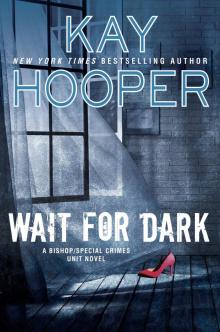 Wait for Dark
Wait for Dark The Glass Shoe
The Glass Shoe It Takes a Thief
It Takes a Thief Zach's Law
Zach's Law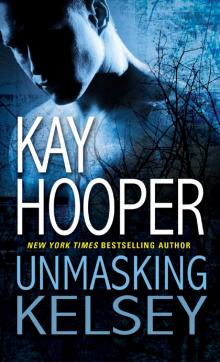 Unmasking Kelsey
Unmasking Kelsey Hidden Salem
Hidden Salem